Purchased for $4.1 million in April of 2018, the 3,960-square-foot, four-bedroom home at 910 Carolina Street, offering “the epitome of modern, comfortable luxury living” atop Potrero Hill, with “superior finishes” and panoramic views, particularly from the roof deck, returned to the market priced at $4.75 million last month, a sale at which would have represented net appreciation of 15.9 percent over the past six years.
And having been positioned as “the ideal haven for work/life balance in one of San Francisco’s hippest urban locations,” the resale of 910 Carolina Street has just closed escrow with a contract price of $4.5 million, or roughly $1,136 per square foot, representing total appreciation of 9.8 percent from the second quarter of 2018 for the (well) above-average home, or roughly 1.6 percent per year on a straight line basis, including the pandemic era squeeze.
At the same, the widely misreported index for “San Francisco” home values, which is trending down, was up 29 percent over the same period of time, with a 26 percent gain for the “top tier” of homes.
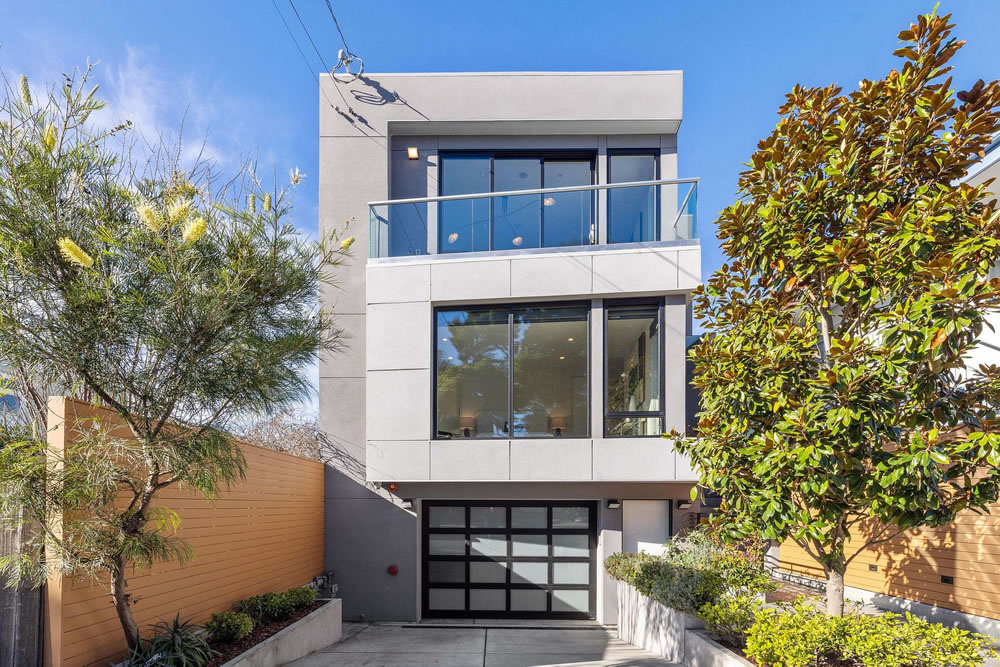
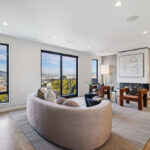
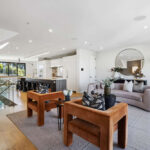
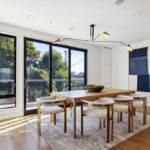
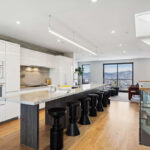
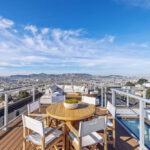


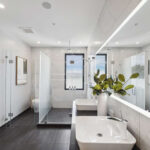
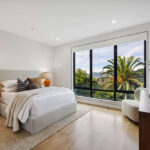
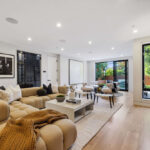
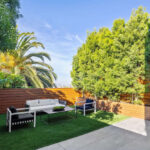
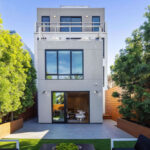
I guess in that sixth photo , the wind socket is behind the camera ?? I realize land is dear in SF and so there’s an incentive to make use of spots that in most parts of the world sane people would just laugh, but really…this particular spot, I can’t but help picturing the screws on the hold-down clamps for the chairs being torn out of their holes on an ongoing basis.
When the home closes, what will in all likelihood happen is that the stager’s manual laborers will remove the chairs and that table and place them back in the warehouse.
For some people who buy a multi-million dollar detached SFH in San Francisco and pay a premium, the home is not to live in, it’s an asset that they are using to park their ill-gotten financial gains derived from bribery, kickbacks, and misappropriation of public funds away from (for one example) the prying eyes of Chairman Xi Jinping’s ongoing anti-corruption campaigns. Such people don’t plan to actually live in it, so if the weather doesn’t permit the actual use of a roof deck or other outdoor space on a regular basis, that’s not going to affect their buying decision or the price they pay.
Is this for real? Is this actually a thing or some sort of Asian panic / prejudice presuming any Asian buying a house must be a corrupt kleptocrat? If they’re parking their assets, why in such a s****y investment as SF real estate with property taxes and tenant rules and dropping prices? Why not in a bunch of rental properties in Alaska or Atlanta? I’m pretty sure with the whole world to hide your money in there’s got to be something better than current SF real estate.
Pre-covid, there was so much foreigh capital flight goosing SF RE prices from newly-minted millionaires from (mosly, but not exclusively) China, that there were junkets with chartered flights and tour buses taking speculators around to the open houses. Using the search engine of your choice, you can learn all about the industry that popped up to cater specifically to foreign speculators in select North American markets. Acknowleding reality isn’t racism or moral panic. In an alternate universe, if the UK were the current ascendant industrial power, it would’ve been tour buses full of Brits. I’d post sample article titles from mainstream media (inclduing Asian media), but you’d probably call me racist.
If they were British and it characterized British people as thieves and then applied whatever stereotype to a single individual unless something specific is known about the individual, then yes- this is a problem.
As I have mentioned around here in the past, I know S.F. agents the bulk of whoms real estate practice is (or at least was, prior to the pandemic) focused on marketing and selling S.F. real estate to that type of buyer. They say that they understand what is going on when an all cash transaction is initiated from a mainland buyer whose ostensible job as a party functionary or municipal civil servant couldn’t possibly provide the income stream necessary to cover their purchase here. If you go back and read the second word in the first sentence in the second paragraph of what I wrote above, this time for comprehension, you’d notice that I am not presuming that any Asian buying a house must be a kleptocrat. But I understand that responding with “Asian panic / prejudice” is a great way to cut off discussion and score cheap rhetorical points.
If you’d like another opinion, you can check out that thread last year when we were discussing a news piece from The Chron which quoted a chief market analyst with real estate firm Compass as saying that the dropoff in foreign investment in S.F. real estate was having a negative impact on the market. To be fair, the editor pooh-poohed this notion at the time.
It’s worth noting that in Canada, reduced affordability in certain housing constrained areas such as Toronto, Vancouver and Montreal prompted the government to impose a temporary ban on foreign home buyers and then extend it for another two years recently. If you think that homes should be a place for domestic residents to live in and not an not an asset class for foreign investors to park their wealth, that is a perfectly reasonable policy. If you’re in the business of benefiting from property prices spiraling out of reach for the local population, then such a policy would not be in your interest.
Btw, I agree with you that there are better asset classes than S.F. real estate, but (again, I was told) for those types of buyers for whatever reason prefer real estate in high-demand/low supply areas where there are lots of Chinese speakers/writers, etc.
There is nothing in your linked articles to support the jump to illegal activity. The first “thread” for another opinion (which just happens to be yours) is just your post of a Chronicle article and a one line reply from the editor. The Chronicle real estate articles are notorious for either advertisements posing as articles or industry experts (brokers) explaining away hiccups and downturns and it’s always time to buy. (the title of the article you cited was “S.F.’s luxury condo market is cooling. Here’s why it might be a good time to buy”)
The second backing link basically refuted whatever points you were trying to make. It talks only about Chinese actually living in Vancouver. ““If your hypothesis was that foreign investment and foreign capital is the most significant driver for housing, we were actually able to test that claim… [we] shut off foreign investment and shut off immigration over a year, and we [still] ended up with an all-time record high home sales….This ban will eliminate buying by Chinese who live in China, but that group accounts for a small share of Chinese buying.” I’m not saying it doesn’t happen- just that it’s an odd choice of article to cite for foreign buyers “parking their wealth.”
It’s especially odd to cite these two things for someone who is insulting others’ reading comprehension.
The amount of scrutiny (AML/KYC) that is given to $1M put into a bank account or brokerage account is far more then the (previously almost non-existent) scrutiny given to a $1M all cash RE purchase. This was not completely irrational since liquid financial assets can be moved quickly and harder to pin down who actually has control of them and what purposes they are being used for. RE by its nature has an immovable physical location and thus can’t be whisked away at a moments notice. But still, money can be parked in RE. Or it can be rented with not much scrutiny given to the rental payment transactions. Or even rent/ownership interest can be traded in a grey market Hawala type system to facilitate illegal activity.
The Treasury Department financial crimes unit FinCEN added some more scrutiny in certain parts of the country, including SF, via what they called Geographic Targeting Orders (GTO). It’s always hard to get estimates of the scale of illegal activity and it’s unclear if the scale of any illegal activity was market moving. But it does seem like it was a glaring loophole in the otherwise tightly regulated US financial system.
The amount of scrutiny (AML/KYC) that is given to $1M put into a bank account or brokerage account is far more then the (previously almost non-existent) scrutiny given to a $1M all cash RE purchase. This was not completely irrational since liquid financial assets can be moved quickly and harder to pin down who actually has control of them and what purposes they are being used for. RE by its nature has an immovable physical location and thus can’t be whisked away at a moments notice. But still, money can be parked in RE. Or it can be rented with not much scrutiny given to the rental payment transactions. Or even rent/ownership interest can be traded in a grey market Hawala type system to facilitate illegal activity.
The Treasury Department financial crimes unit FinCEN added some more scrutiny in certain parts of the country, including SF, via what they called Geographic Targeting Orders (GTO). It’s always hard to get estimates of the scale of illegal activity and it’s unclear if the scale of any illegal activity was market moving. But it does seem like it was a glaring loophole in the otherwise tightly regulated US financial system.
Despite the “for some people…”, it seems to be heavily implied that the funds used to purchase this property are ill-gotten/illegal. Is something specific known about this buyer or just that they are apparently from Chinese?
I thought one of the points of living in Potrero Hill was the better weather, at least on days like, well, today.
You may be correct – I’m seeing 72 with [minor wind], but how many days are like this? Looking out over an unobstructed stretch like that it’s hard to believe it isn’t windy… a lot.
I would probably avoid permanent furniture on a roof deck, not because of the wind, but because of the urban grime. Maybe those plastic pieces they make, but filled with sand. You can just hose them off…
That west facing rooftop deck is sure to see very windy afternoons/evenings. I once lived on Pennsylvania Ave near 22nd St – the area was wind shielded by the very hill this house sits atop. We could see the fog coming in to the north over downtown and south over the Bayview but rarely over our area (except when it blew in all the way to the East Bay hills). The weather was mostly warmer than the rest of the city and our backyard vegetable garden in summer yielded enough tomatoes and zucchini (along with string beans and on one year white corn!) to give the overflow to the neighbors.
Exterior has curb appeal of light industrial building. The 6 black counter stools under flourescent light tube is kind of ugly. I’m not feeling it. Its located across the street from massive public utilities site at 901 Carolina.